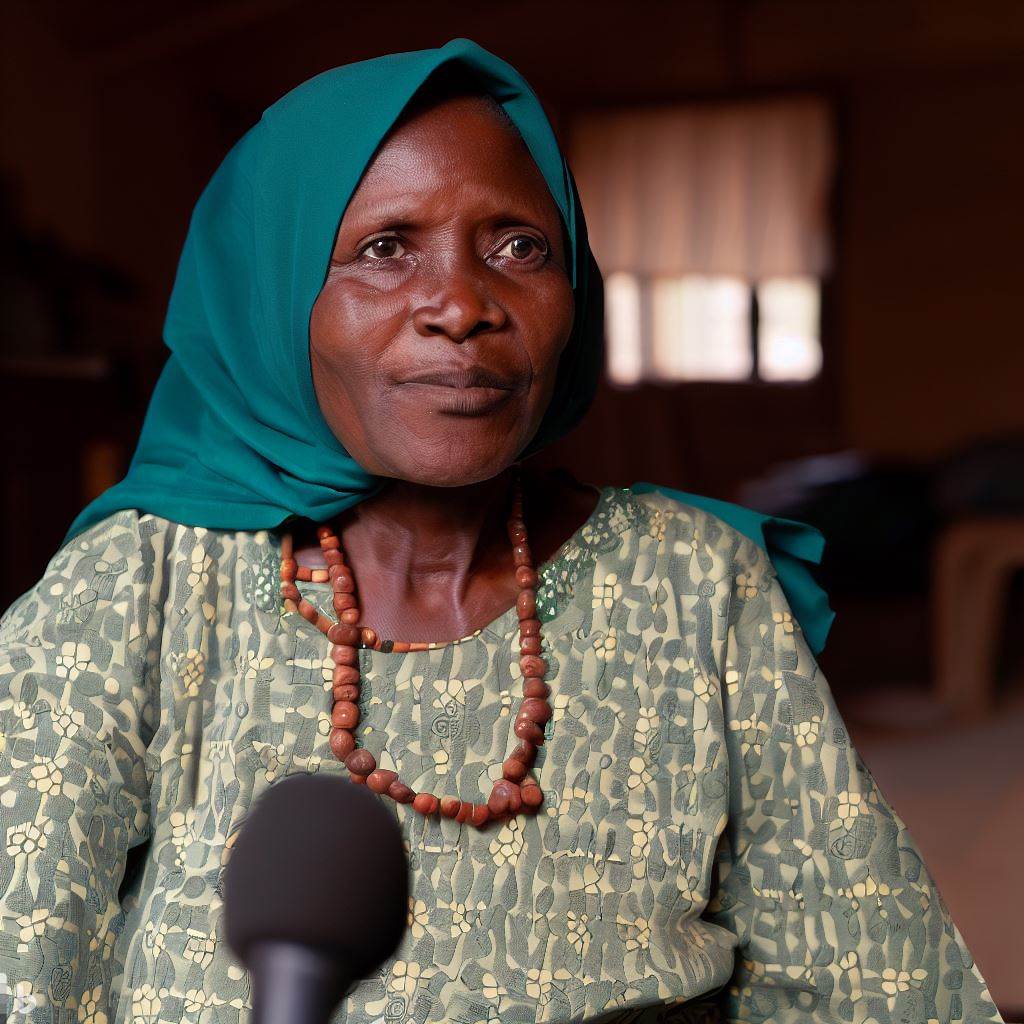Introduction
The nutritionist profession in Nigeria plays a crucial role in improving the health and well-being of individuals through proper nutrition.
This blog will explore the focus on gender and diversity aspects within the nutritionist profession in Nigeria.
In Nigeria, the nutritionist profession is essential for promoting good health and preventing diseases through proper nutrition practices.
These professionals work in various settings such as hospitals, community health centers, and schools, educating people on the importance of healthy eating habits and designing personalized nutrition plans.
However, within the nutritionist profession in Nigeria, gender and diversity aspects are gaining recognition and significance.
Historically, there has been a lack of equal representation of women in the field, with men dominating the profession. This has resulted in a limited perspective on nutrition practices, overlooking the unique dietary needs and concerns of women.
Additionally, to effectively address the dietary needs of a diverse population, inclusivity and cultural sensitivity are critical. Nigeria is a nation rich in cultural diversity, and it is imperative for nutritionists to consider the various cultural practices and beliefs when developing nutrition plans.
This ensures that individuals from different ethnic backgrounds receive appropriate and relevant advice.
Addressing gender and diversity aspects in the nutritionist profession not only promotes equality but also enhances the quality of nutritional care provided. By encouraging more women to join the profession, a broader range of perspectives and experiences can be incorporated into nutrition practices.
In essence, this blog will delve deeper into the gender and diversity aspects within the nutritionist profession in Nigeria.
By recognizing the importance of inclusivity and equal representation, we can work towards a more informed and effective approach to nutrition practices in the country.
Background of the Nutritionist Profession in Nigeria
Definition and roles of a nutritionist
- A nutritionist is a trained professional who specializes in food and diet-related concerns.
- The primary role of a nutritionist is to assess, plan, and provide guidance on nutritional needs.
- Nutritionists help individuals or communities improve their overall health and well-being through proper nutrition.
- They work in various settings such as hospitals, clinics, schools, and research institutions.
- They develop personalized diets, educate clients on healthy eating habits, and monitor their progress.
- Nutritionists also conduct research to understand the relationship between diet and diseases.
- They play a crucial role in preventing and managing chronic diseases, such as obesity, diabetes, and heart disease.
- They often collaborate with other healthcare professionals to provide comprehensive care to patients.
Importance of nutritionists in promoting health and well-being
- Proper nutrition is essential for optimal health and well-being.
- Nutritionists help individuals achieve and maintain a balanced diet.
- They provide guidance on portion control, nutrient intake, and dietary modifications.
- Nutritionists educate individuals on the importance of consuming a variety of foods from different food groups.
- They promote healthy eating habits to prevent malnutrition, nutritional deficiencies, and related diseases.
- Nutritionists also work with specific populations, such as pregnant women, children, and athletes, to meet their unique nutritional needs.
- By promoting healthy eating, they contribute to the overall well-being and quality of life of individuals.
Current status of the nutritionist profession in Nigeria
The nutritionist profession in Nigeria is gaining recognition and importance. With the increasing prevalence of diet-related diseases, the demand for nutritionists is growing.
Nigerian universities offer programs in nutrition and dietetics to train professionals in the field.
There is a need for more nutritionists to address the nutrition challenges faced by the Nigerian population. However, the profession in Nigeria faces various challenges, including gender and diversity issues.
Gender inequality exists, with more female nutritionists compared to male nutritionists. There is a lack of diversity in the profession, with a limited representation of different ethnicities and backgrounds.
Efforts are being made to address these issues by promoting equal opportunities and diversity in nutrition education and practice.
Basically, nutritionists in Nigeria play a vital role in promoting health and well-being. They provide guidance and education on proper nutrition, helping individuals and communities achieve optimal health.
However, the profession still faces challenges related to gender inequality and lack of diversity. Efforts are needed to address these issues and ensure equal opportunities for all aspiring nutritionists in Nigeria.
Read: How to Start Your Career as a Process Engineer in Nigeria
Gender Disparities in the Nutritionist Profession
According to recent statistics, females are significantly underrepresented in the nutritionist profession in Nigeria.
Societal expectations and stereotypes play a major role in discouraging women from pursuing a career in nutrition.
Women in Nigeria often face limited access to quality education, which hinders their chances of entering the nutritionist profession.
With a gender imbalance in the profession, there is a lack of diverse perspectives and ideas in the field of nutrition. This limits innovation and growth.
Narrow health approaches and interventions
Gender disparities in the nutritionist profession can lead to narrow health approaches and interventions that do not address the unique needs of both males and females.
Gender disparities in the nutritionist profession have far-reaching consequences, not only for the profession itself but also for individuals seeking nutritional advice and guidance. It is important to address these disparities and promote gender diversity in the field.
By encouraging more females to pursue a career in nutrition, we can tap into a wealth of untapped talent and expertise, leading to better health outcomes for individuals and the overall population.
Efforts should be made to challenge societal expectations and stereotypes that discourage women from entering the profession. This can be done through awareness campaigns and educational programs that emphasize the importance of gender equality in the field of nutrition.
Additionally, improving educational opportunities for women is crucial. This includes providing scholarships and equal access to nutrition education at all levels.
By addressing gender disparities in the nutritionist profession, we can ensure a more inclusive and diverse field that benefits both individuals and society as a whole. With a range of perspectives and ideas, nutritionists can design interventions that cater to the unique needs of different populations.
Furthermore, a gender-diverse profession fosters a supportive and inclusive environment for both male and female nutritionists. This can lead to increased collaboration and knowledge exchange, ultimately advancing the field of nutrition in Nigeria.
Ultimately, it is clear that gender disparities exist in the nutritionist profession in Nigeria. By understanding the factors contributing to this imbalance and working towards greater gender diversity, we can create a more inclusive and impactful field of nutrition.
This will benefit not only professionals but also individuals seeking nutritional guidance and the overall health of the population.
Read: Nigeria’s National Sports Policies: An In-Depth Review
Efforts to Promote Gender Equality in the Nutritionist Profession
Initiatives by professional organizations and associations
Professional organizations and associations are taking active measures to promote gender equality in the nutritionist profession.
They are creating programs and initiatives that aim to encourage more females to pursue a career in nutrition.
These organizations provide mentorship and networking opportunities for female nutritionists, helping them advance in their careers.
They also offer scholarships and grants specifically designed for women in the field of nutrition.
By actively supporting and promoting women in the profession, these organizations are helping bridge the gender gap in the industry.
Educational and training programs targeted at females
Educational institutions are introducing specialized programs to attract and train more females in the nutritionist profession.
These programs focus on providing girls and women with the necessary skills and knowledge to excel in the field of nutrition.
They create a supportive and inclusive learning environment that encourages female students to pursue careers in nutrition.
By addressing gender-specific barriers and challenges, these programs help empower women and increase their representation in the profession.
Moreover, they provide mentorship and guidance to female students, helping them navigate their career paths successfully.
Advocacy for policy changes focused on gender equality
Advocacy groups and individuals are advocating for policy changes that promote gender equality in the nutritionist profession.
They are raising awareness about the gender disparities that exist within the industry, highlighting the importance of equal opportunities for all.
These advocacy efforts aim to eliminate gender-based discrimination and biases that may hinder women’s progression in the profession.
They strive to create an inclusive and equitable work environment where both male and female nutritionists can thrive.
These advocacy initiatives also seek to ensure equal pay and benefits for all nutritionists, regardless of their gender.
In fact, various efforts are being made to promote gender equality in the nutritionist profession in Nigeria.
Professional organizations and associations are implementing initiatives to support and empower women in the field.
Educational institutions are introducing specialized programs to attract and train more females in nutrition.
Advocacy groups are working towards policy changes that eliminate gender disparities and create an inclusive work environment.
By implementing these measures, Nigeria can foster a more diverse and equal nutritionist profession moving forward.
Read: Challenges and Opportunities in Process Engineering in Nigeria

Benefits of Gender Diversity in the Nutritionist Profession
Achieving gender diversity in the nutritionist profession offers numerous advantages that can contribute to its growth and success.
These benefits include:
Enhanced creativity and problem-solving abilities
- Gender diverse teams bring different perspectives and life experiences, leading to increased creativity in problem-solving.
- Collaboration between professionals of different genders encourages innovative thinking and fresh approaches.
- Diverse teams are more likely to come up with a wider range of solutions to complex issues in nutrition.
Greater accessibility and acceptance of nutrition services
Having a diverse group of nutritionists ensures that clients from various backgrounds can find someone they feel comfortable working with.
Representation matters – individuals may feel more at ease seeking help from a nutritionist who shares their gender or cultural background.
Gender-diverse teams can address the unique needs and concerns of a broader range of clients, resulting in improved accessibility to nutrition services.
Having nutritionists from different genders can also help reduce stigma associated with seeking professional help in certain communities.
Improved research and policy development
- Gender diversity in the nutritionist profession leads to a more comprehensive understanding of dietary patterns and behavior.
- Diverse research teams provide different insights and perspectives, leading to a more accurate portrayal of population health.
- Gender-balanced research produces findings and recommendations that better reflect the needs of both men and women.
- Policies developed by diverse professionals are more likely to be inclusive and consider the diverse needs of the population.
- Gender-diverse nutritionist teams can contribute to the development of more effective public health interventions and programs.
Overall, gender diversity in the nutritionist profession brings numerous benefits. It enhances creativity and problem-solving abilities, improves accessibility to nutrition services, and contributes to better research and policy development.
Promoting gender diversity within the profession should be a priority to create an inclusive and effective healthcare system in Nigeria.
Read: Process Engineering: Salary and Job Prospects in Nigeria
Addressing Diversity in the Nutritionist Profession
In order to promote inclusivity and represent marginalized groups, there are several steps that can be taken in the nutritionist profession. These steps include:
Examination of diversity beyond gender
While gender is an important aspect of diversity, it is crucial to look beyond it to address other forms of diversity as well. This includes considering factors such as race, ethnicity, age, disability, and socioeconomic status.
- Recognizing the importance of intersectionality: It is essential to understand that individuals may experience discrimination and disadvantage due to multiple aspects of their identity.
- Gathering data on diversity in the profession: Collecting data on the demographics of nutritionists can help identify underrepresentation and gaps that need to be addressed.
- Conducting research on the experiences of marginalized groups: Research can shed light on the challenges faced by individuals from diverse backgrounds and inform strategies for creating a more inclusive profession.
Encouraging inclusivity and representation of marginalized groups
It is important to actively promote inclusivity and representation of marginalized groups in the nutritionist profession.
- Implementing diversity initiatives: Organizing programs and initiatives that specifically target underrepresented groups can help attract and retain diverse talent.
- Collaborating with diverse communities: Engaging with diverse communities can help build trust, establish partnerships, and ensure that nutrition services are culturally sensitive and relevant.
- Providing mentorship and support: Offering mentorship programs and support networks can help individuals from marginalized backgrounds navigate the challenges they may face in the profession.
Introducing cultural competency training in nutrition education
Cultural competency training plays a crucial role in preparing nutritionists to effectively serve diverse populations.
- Incorporating diversity and cultural competency into curricula: Including courses and modules that focus on diversity, cultural understanding, and communication skills can enhance the education of future nutritionists.
- Providing ongoing professional development: Continuing education programs and workshops can help practicing nutritionists stay updated on cultural competence and enhance their skills in working with diverse populations.
- Encouraging cultural immersion experiences: Exposing nutrition students to diverse cultural settings can broaden their perspectives and increase their cultural competence.
In a nutshell, addressing diversity in the nutritionist profession requires a multifaceted approach that goes beyond gender.
By examining diversity beyond gender, encouraging inclusivity and representation of marginalized groups, and introducing cultural competency training in nutrition education, progress can be made towards creating a more diverse and inclusive profession.
Conclusion
On a final note, it is crucial to address gender and diversity aspects in the nutritionist profession in Nigeria. This is because:
- Equality and inclusivity are fundamental human rights that should be upheld in all sectors.
- By promoting diversity, we can tap into a wider range of skills, perspectives, and ideas.
- Addressing gender disparities can help bridge the gap and provide equal opportunities for women.
- Diversity also helps to better serve the diverse population in Nigeria and meet their unique nutritional needs.
- Breaking down gender stereotypes and biases can lead to more equitable and inclusive workplaces.
Therefore, it is important for stakeholders in the nutritionist profession to actively work towards creating an inclusive environment that supports gender equality and celebrates diversity.
To promote equal opportunities and foster diversity in the nutritionist profession:
- Establish policies and guidelines that prioritize gender equality and diversity.
- Offer training and educational programs that address unconscious biases, cultural awareness, and sensitivity.
- Implement recruitment and hiring practices that promote diversity and inclusion.
- Create mentorship and sponsorship programs to support underrepresented groups in the field.
- Encourage research and studies on gender and diversity aspects in nutrition and healthcare.
- Collaborate with organizations and institutions that champion gender equality and diversity.
- Advocate for policy changes that aim to reduce gender disparities and promote inclusivity in the profession.
By taking these actions, we can ensure that the nutritionist profession in Nigeria becomes more inclusive, equitable, and diverse.




